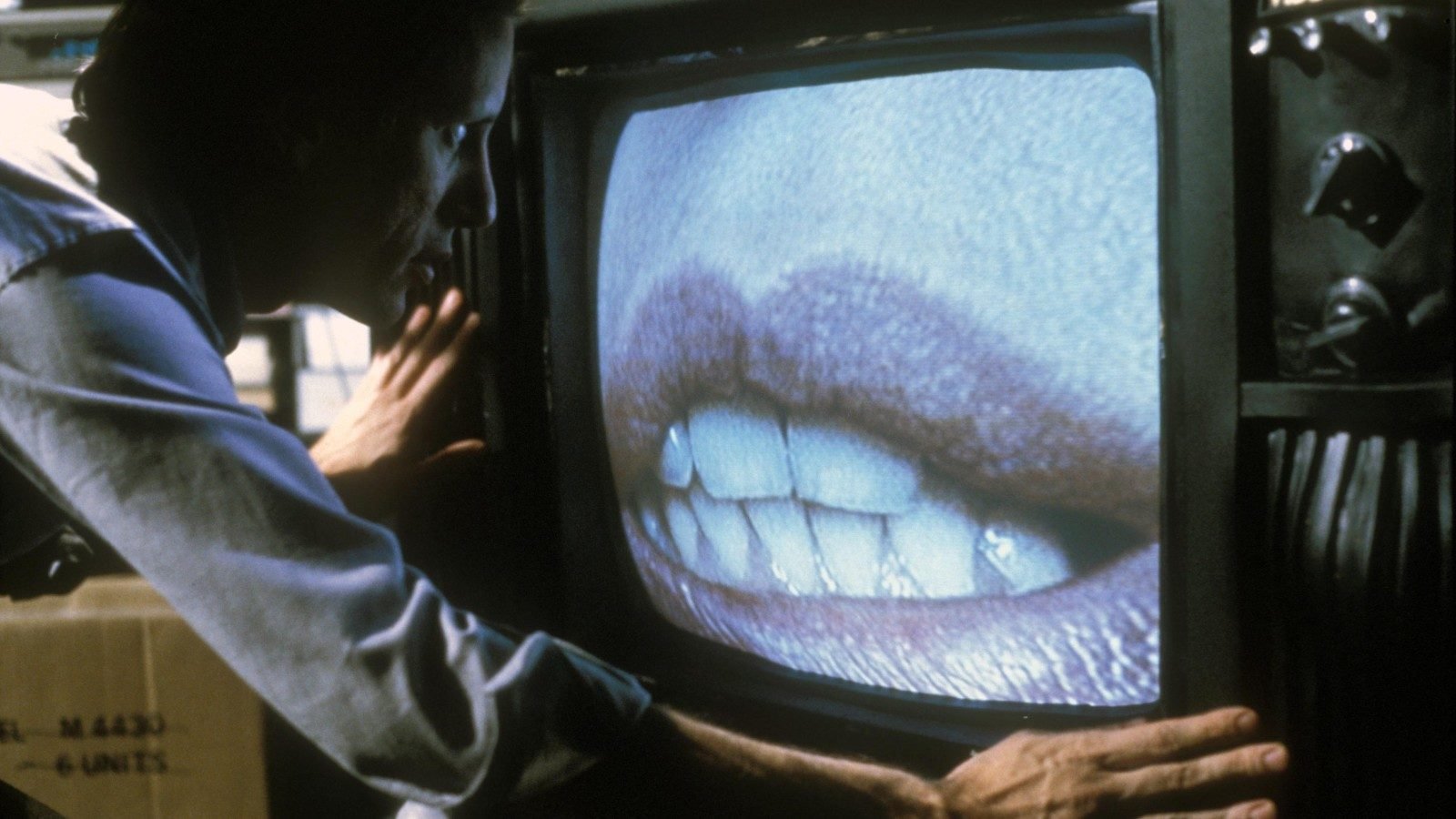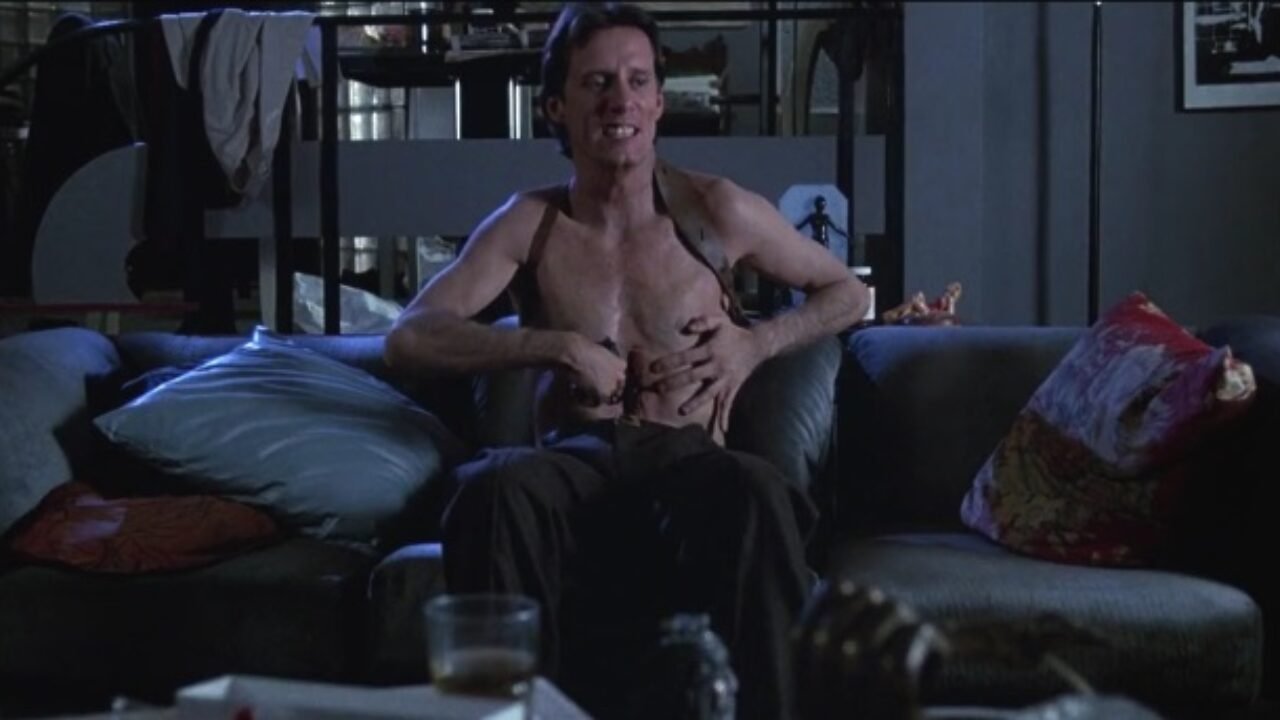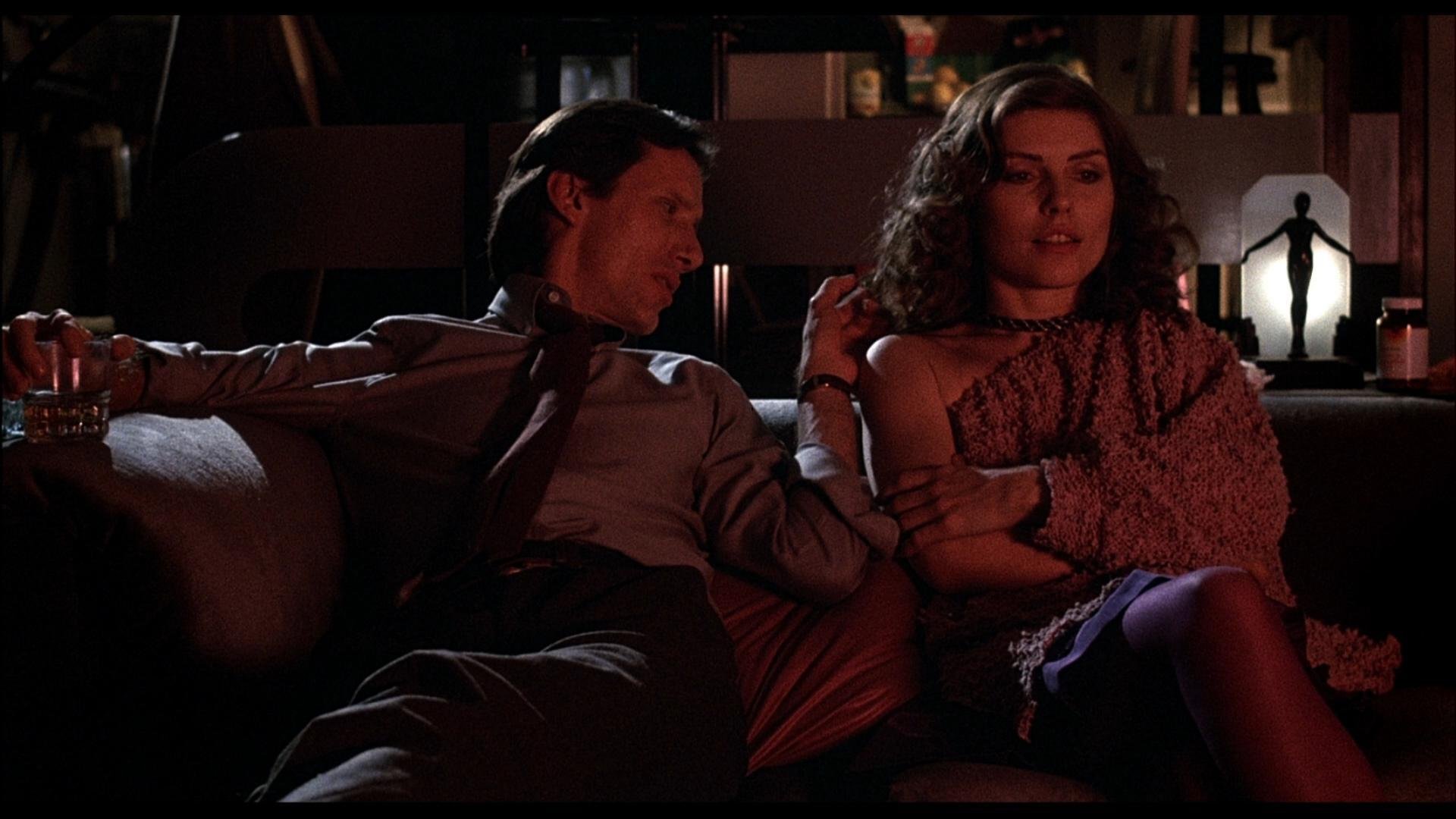[Film Review] Videodrome (1983)
David Cronenberg’s 1983 body-horror classic Videodrome, centers its narrative around consumerism, sadomasochism and the horrifying mutation and degradation of the human form. Although the film was released nearly four decades ago, its depiction of violent media & the evils of capitalism has become increasingly more relevant with time.
The film follows Max Renn (James Woods), President of small-time Toronto television station Civic-TV, and his hunt to find the sleaziest, most shocking programming to broadcast to his depraved audience. Max appears on a local talk show to answer questions about his ongoing quest to showcase bizarre and extreme adult content. Subsequently, he’s introduced to enigmatic radio crisis-line host Nicki Brand (Debbie Harry), and the mysterious TV personality Brian O’Blivion (Jack Creley), who theorizes that television will soon become true human reality. At this point in the film, the well-established tone of capitalist greed has been set, and it permeates throughout the story as many of the characters continue to prioritize profit over substance.
After the interview, Nicki and Max begin a lustful relationship where it’s revealed early on that she has a multitude of intense kinks, from sadomasochistic knife play to having cigarettes put out on her own skin and more. This aspect of Nicki’s character is particularly interesting, as she is shown to be completely in control of her own bodily autonomy as well as being unapologetic about her brazen sexual deviancy. Max then shows her a copy of a tape he has tracked down to purchase for his channel, simply named ‘Videodrome’. The tape is a pirated broadcast from Pittsburgh and it holds graphic depictions of eroticized torture and murder with no plot or easily discernible reason for existing. Entranced by the idea of absolute pleasure, Nicki takes things a step further and decides to audition to be a victim on the show.
The alluring nature of extreme content has been a topic of discussion since the dawn of broadcasting, and today this sentiment echoes throughout hundreds of internet shock-sites. These pages are dedicated to the visceral and morbid realities of life, as well as the fragility of the human body. While these types of sites can often scar and traumatize those that come across them, others (similarly to Videodrome’s main characters) feel drawn to such extremity, even finding arousal from this controversial category of visual media. Nicki and Max however, end up with more than just a few scars of their own from watching the contents of the tape together.
When Nicki leaves against Max’s wishes, he sets out to find her, and in turn uncovers the truth about Videodrome and its producers. Brian O’blivion and his daughter are partially responsible for broadcasting Videodrome and reveal to Max that viewers of the tape begin to develop hallucination-inducing brain tumors immediately after watching it. The goal of the project, funded by a seemingly inconspicuous high-end eyewear company, is to eventually use the program and the aforementioned hallucinations as a weapon of war. These revelations add new, horrifying layers of meaning to the film as it delves deeper into anti-capitalistic and anti-imperialist themes.
HAVE YOU LISTENED TO OUR PODCAST YET?
As Max attempts to stop the businessmen behind the project, the horrors of Videodrome become more apparent. Not only is he plagued by frequent visions of Nicki calling to him from inside of his TV set, he is also subject to increasingly distressing bodily mutations and classic Cronenberg body-horror courtesy of famed SFX artist Rick Baker. Between the gaping, vulva-esque stomach cavity and the pistol that melds with his hand, Max finds himself becoming a grotesque heap of flesh and metallic hardware. This loss of bodily and mental autonomy begins to eat away at Max, reflecting the primal fear of losing control over your own physical being, a fascinating concept that continually shows up in horror media.
Eventually Nicki calls to him a final time, luring him to join her on the other side of death, to “not be afraid to let his body die.” Max learns that he must leave behind his mortal flesh and join Nicki to fight the evil conspiracies of Videodrome from the inside. He ends his own life with the gun that’s become fused to his hand, and as the credits begin to roll, we’re left with a perfectly grim and ambiguous ending to a story that cuts much deeper psychologically than most might have been expecting.
Did Max ever reunite with Nicki within the television set, or were his final moments just another twisted delusion caused by the tumor growing inside of his skull? Is it better to never find out? While the ambiguity remains, being able to analyze this strange and wonderful film for yourself is half of the fun, and it may surprise you how socially relevant it remains after so many years, especially in today’s internet age where we experience a constant flow of stimulating content and media influence.
Between incredible performances from the entire cast, a unique and timelessly relevant storyline, and some absolutely disturbing SFX makeup, it’s no wonder that Videodrome is commonly cited as one of Cronenberg’s most beloved releases. I encourage anyone who enjoys body-horror, psychological thrillers, unraveling conspiracies, and/or Debbie Harry to give this one a watch (or maybe three)! In the words of Nicki Brand herself, “Death to Videodrome. Long live the new flesh!”





![[Film Review] Flights of Reverie (2025)](https://images.squarespace-cdn.com/content/v1/5fe76a518d20536a3fbd7246/1769111579457-CTUW03G3J34P6SFRWWEM/flights-of-reverie-filmstill-ornithologist-berlin-li-wallis06.jpg)
![[Film Review] Confessions in Static (2025)](https://images.squarespace-cdn.com/content/v1/5fe76a518d20536a3fbd7246/1768397467245-3KOF3LUBRDQVJ8QVDONA/Confessions_Key_Alternate_1920x1080.png)
![[Film Review] Stalker (2025)](https://images.squarespace-cdn.com/content/v1/5fe76a518d20536a3fbd7246/1768232505839-TS9K7YBLOXNQML8PUWTP/Screenshot+2026-01-12+at+15.17.49.png)
![[Film Review] Bone Lake (2025)](https://images.squarespace-cdn.com/content/v1/5fe76a518d20536a3fbd7246/1768151214859-U1AUN7JALKRK4W5NGJVH/Andra+Nechita+and+Maddie+Hasson+in+Bone+Lake+%28Signature+Entertainment%29+1.jpg)
![[Film Review] 28 Years Later: The Bone Temple (2026)](https://images.squarespace-cdn.com/content/v1/5fe76a518d20536a3fbd7246/1768152692285-7TK6SN62JY4H3TJDYABP/The+Bone+temple.jpg)
![[Film Review] Pelverata (2025)](https://images.squarespace-cdn.com/content/v1/5fe76a518d20536a3fbd7246/1767549668681-1TW6BD7QQHK8WS8L4IVT/Screenshot+2026-01-04+at+17.57.01.png)
![[Film Review] A study of the human ability to endure self-inflicted pain in XXXDarknet: Red Lips](https://images.squarespace-cdn.com/content/v1/5fe76a518d20536a3fbd7246/1767542371615-YUJBD442MS9NAGEB45D7/redlips.jpg)














![[Editorial] Oscar Nominations 2026: Where to stream all the horror picks](https://images.squarespace-cdn.com/content/v1/5fe76a518d20536a3fbd7246/1769113319180-4INRRNMZK4DZLHRSUXX5/rev-1-GRC-TT-0026r_High_Res_JPEG-1024x372.jpeg)
![[Editorial] 10 Films & Events to Catch at Soho Horror Film Fest 2023](https://images.squarespace-cdn.com/content/v1/5fe76a518d20536a3fbd7246/1700819417135-299R7L4P0B676AD3RO1X/Screenshot+2023-11-24+at+09.41.52.png)
![[Editorial] 9 Horror Nintendo Switch Games To Play](https://images.squarespace-cdn.com/content/v1/5fe76a518d20536a3fbd7246/1697214470057-3XZXX8N4LYIMDFWS6Z3P/Screenshot+2023-10-13+at+17.20.13.png)
![[Mother of Fears] Mothering in Silence in A Quiet Place (2018)](https://images.squarespace-cdn.com/content/v1/5fe76a518d20536a3fbd7246/1696445921315-HZJ2DZYQIH6VVWXBO2YL/Screenshot+2023-10-04+at+19.52.29.png)
![[Editorial] 5 Female Focused Horror Book Recommendations](https://images.squarespace-cdn.com/content/v1/5fe76a518d20536a3fbd7246/1696441981361-52EQCTJ7AT2QF1927GM7/919xtm6d3fL._AC_UF894%2C1000_QL80_.jpg)
![[Editorial] 9 Best Slashers Released Within 10 Years of Scream (1996)](https://images.squarespace-cdn.com/content/v1/5fe76a518d20536a3fbd7246/1695478839037-LOFHGVM3H6BMSZW7G83M/Screenshot+2023-09-23+at+15.15.11.png)
![[Mother of Fears] Mother Vs. Monster in Silent Hill (2006)](https://images.squarespace-cdn.com/content/v1/5fe76a518d20536a3fbd7246/1695485781119-H6GNP0G3J2TLPAOIABV7/Screenshot+2023-09-23+at+17.11.56.png)
![[Editorial] 9 Terrifying Cerebral Visions in Horror Movies](https://images.squarespace-cdn.com/content/v1/5fe76a518d20536a3fbd7246/1693509801235-X23OL50T1DVGECH0ZJK2/MV5BMjQ0MTg2MjQ4MV5BMl5BanBnXkFtZTgwMTU3NDgxMTI%40._V1_.jpg)

The life of a Silent Hill fan is a turbulent one. For every Silent Hill 3, there’s a Silent Hill: Homecoming. For every Silent Hill 2 Remake, there’s a Silent Hill: Ascension. For every Silent Hill f, there’s a Return to Silent Hill, and thus, the pendulum continues to swing, this time into frustrating - but expected - disappointment.